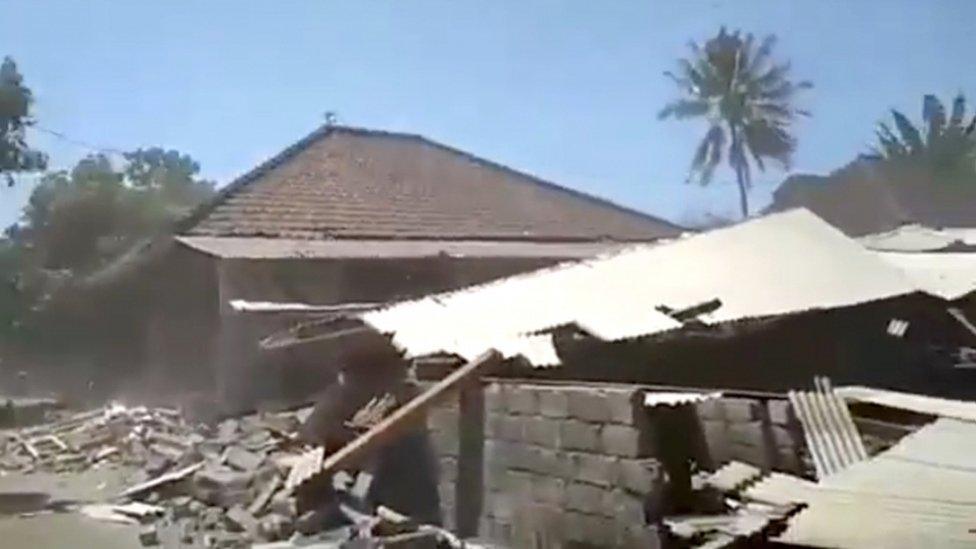Indonesia tsunami: Aftershocks rock Palu day after disaster
- Published
Dramatic video shows buildings being knocked down
Strong aftershocks have continued to hit the Indonesian island of Sulawesi, where a major quake and tsunami killed at least 408 people and injured 500.
Dozens remain missing, some thought to be trapped in the debris of collapsed buildings in the city of Palu.
Bodies have been lying in city streets and the injured are being treated in tents because of damage to hospitals.
An air traffic controller at Palu airport died ensuring a plane took off safely after Friday's quake.
The scale of casualties and damage beyond the city is still unclear.
Anxious survivors in Palu bedded down in the open air on Saturday night, heeding advice by officials not to return to their homes as a precaution. Some buildings were completely flattened.
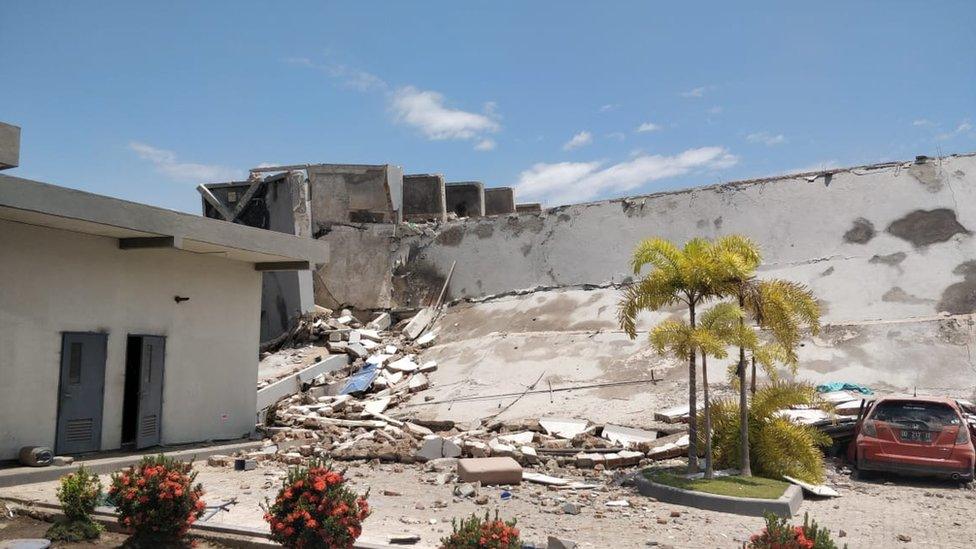
It is feared people are trapped in the debris of Palu's Roa Roa Hotel
Indonesia is prone to earthquakes because it lies on the Ring of Fire - the line of frequent quakes and volcanic eruptions that circles virtually the entire Pacific rim.
In 2004, a tsunami triggered by an earthquake off the Indonesian island of Sumatra killed 226,000 people across the Indian Ocean, including more than 120,000 in Indonesia.

'We don't know their fate'
By Rebecca Henschke, BBC News, Sulawesi
As we travel to the area devastated by the huge quake and tsunami we are meeting people heading the same way desperate to find out the fate of their loved ones.
"I know I have already lost three family members," one man told me, "two of them elderly relatives but one was a young father."
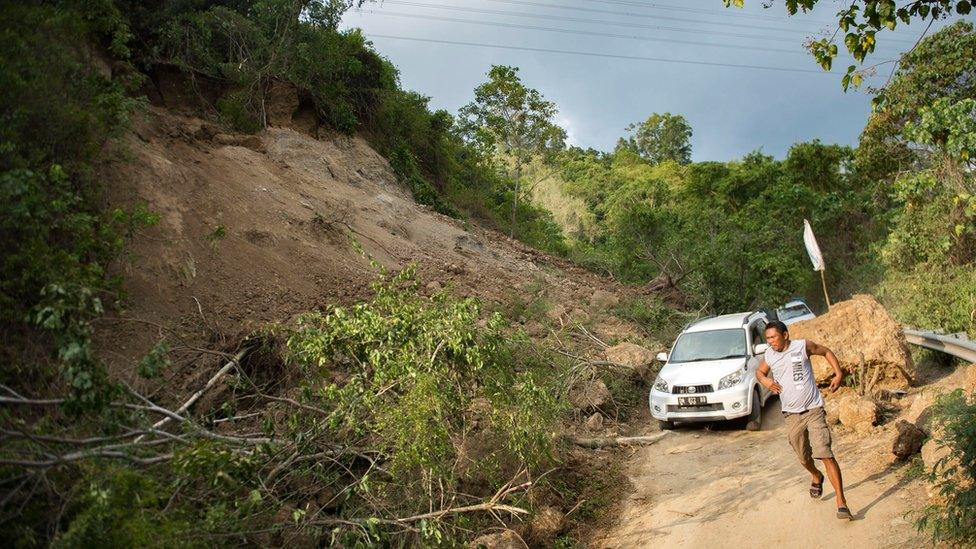
This road near Palu was partially blocked by a landslide
Other members of his family are still missing. "We don't know their fate," he tells me.
The images of devastation coming out of Palu are all too eerily familiar to many Indonesians. They evoke memories of the devastating tsunami of 2004 that hit the province of Aceh.

Why were so many killed on Friday?
A 7.5 magnitude quake occurred at a shallow depth of 10km (6.2 miles) , externaljust off central Sulawesi at 18:03 (10:03 GMT), US monitors say.


A tsunami warning was issued but lifted within the hour.
Indonesia's meteorological agency has been criticised for its response but officials say the waves struck while the warning was in place.
People including dancers were still busy on the beach in Palu (population: 335,000), preparing for a festival, and were caught when waves up to 3m (10ft) in height swept in.
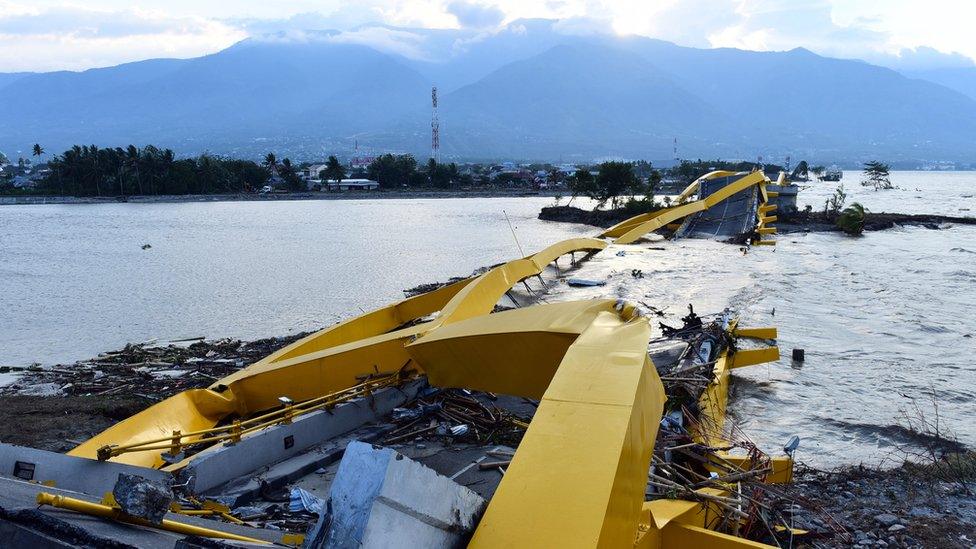
Palu's landmark Ponulele Bridge came down
Video on social media shows people screaming and fleeing in panic.
"The tsunami... dragged cars, logs, houses," Sutopo Purwo Nugroho, a spokesman for Indonesia's disaster agency, told Reuters news agency. "It hit everything on land."


Some people survived by climbing 6m (18ft) trees, he added.
As well as destroying homes, the quake wrecked a shopping centre, a mosque, a hotel and a road bridge.
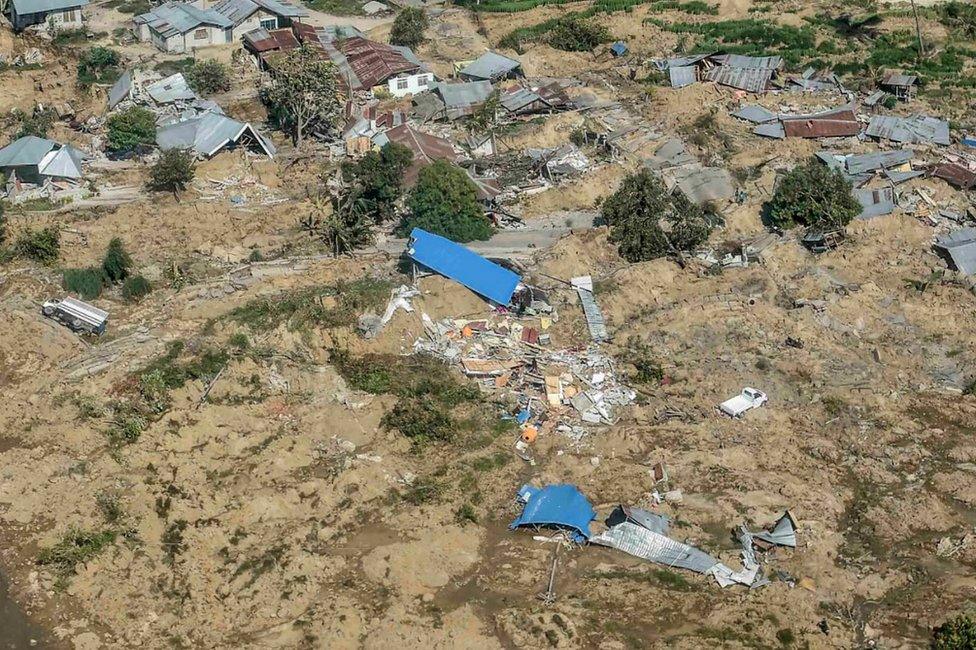
Homes were wiped away in Palu
Reports are still coming in of the impact of the disaster on communities further up the coast from Palu and closer to the quake's epicentre, including the smaller town of Donggala, where there was at least one death and 10 people were injured.
"We have heard nothing from Donggala and this is extremely worrying," the Red Cross said in a statement.
"This is already a tragedy, but it could get much worse."
What are survivors saying about their ordeal?
When the quake hit, "we all panicked and ran out of the house," Anser Bachmid, 39, told AFP news agency. "People here need aid - food, drink, clean water. We don't know what to eat for dinner tonight."
"I just ran when I saw the waves hitting homes on the coastline," Palu resident Rusidanto said.
Dwi Haris, who was in the city for a wedding, was staying in a hotel with his wife and daughter when the quake struck.
"There was no time to save ourselves,", external he told the Associated Press news agency. "I was squeezed into the ruins of the wall... I heard my wife cry for help but then silence. I don't know what happened to her and my child. I hope they are safe."
With back and shoulder injuries, he is being treated outdoors at Palu's Army Hospital.
What is being done to help?
Aid is being flown from the capital Jakarta into Palu airport, using the part of its runway still intact.
Some people injured or affected by the quake were evacuated on a military transport plane.
Patients are being treated in the open outside city hospitals and at least one military field hospital has been erected.
Outside one hospital, dead bodies were laid out in bags for relatives to come and look for loved ones.

People have been living out in the open since the quake in Palu
The regional head of the Indonesian Doctors Association (IDI), Komang, asked the authorities for immediate help.
"We need tents, medicines, medical personnel, tarpaulins, blankets and more of other things," he said.
Relief efforts are being hampered by power cuts and damage to roads and other infrastructure.
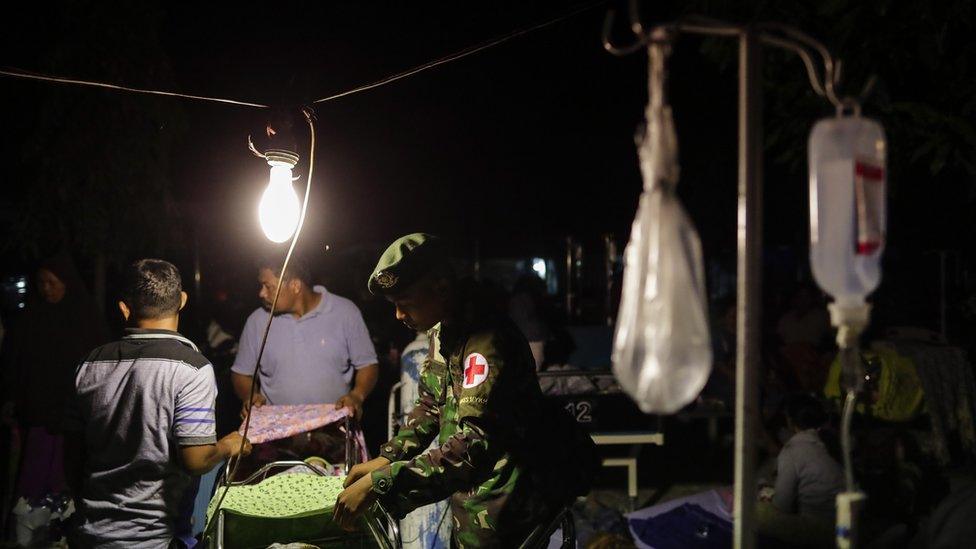
A field hospital is treating the injuring in Palu
The UK-based charity Save the Children is sending an assessment team to the disaster zone.
"Unfortunately the more information that we're getting, the worse the situation appears to be," charity spokesman Tom Howells told the BBC from Jakarta.
What happened at the airport?
Anthonius Gunawan Agung, 21, was the only person left in the airport's control tower after the earthquake, external, Australian broadcaster ABC reports.
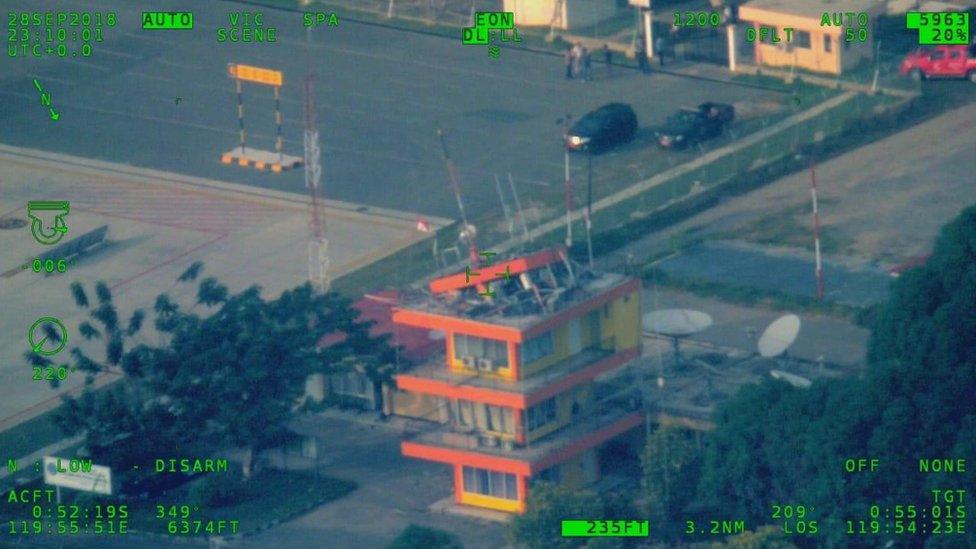
The shattered tower at the airport
The rest had run for their lives when the tower started to sway but Mr Agung stayed behind to ensure Batik Air Flight 6321, which was on the runway, got away safely.
He then jumped from the fourth floor of the tower, fearing it was about to collapse, and was fatally injured.
Yohannes Sirait, spokesman for Air Navigation Indonesia, said he had potentially saved the lives of hundreds of people aboard the plane, losing his own in the process.
Colleagues paid tribute on Twitter, sharing photos of Mr Agung and soldiers carrying his covered body past a guard of honour.
Allow X content?
This article contains content provided by X. We ask for your permission before anything is loaded, as they may be using cookies and other technologies. You may want to read X’s cookie policy, external and privacy policy, external before accepting. To view this content choose ‘accept and continue’.

Allow X content?
This article contains content provided by X. We ask for your permission before anything is loaded, as they may be using cookies and other technologies. You may want to read X’s cookie policy, external and privacy policy, external before accepting. To view this content choose ‘accept and continue’.

In another development, more than half the 560 inmates at Palu's prison escaped after its walls collapsed, the Associated Press reports.
"It was very hard for the security guards to stop the inmates from running away as they were so panicked," said its warden, Adhi Yan Ricoh.
How big a hazard are quakes for Indonesia?
More than half of the world's active volcanoes above sea level are part of the Ring of Fire.
Just last month, a series of deadly earthquakes struck the Indonesian island of Lombok. The biggest, on 5 August, killed more than 460 people.
- Published19 August 2018
